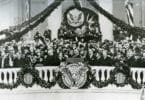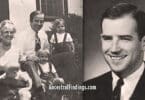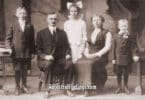As we continue our Pillars of Power series, exploring the lives and legacies of America’s presidents, we turn to Harry S. Truman—a man who never expected to lead the nation. When Franklin D. Roosevelt passed away in April 1945, the weight of the presidency fell onto Truman’s shoulders. Suddenly, this unassuming man from Missouri was thrust into leadership at one of the most critical junctures in history. What followed was a presidency defined by world-changing decisions from the end of World War II to the dawn of the Cold War. Join us as we uncover Truman’s unexpected rise to power, his family roots, and his vision for a postwar world that reshaped America’s role on the global stage.
Early Life and Family Background
Harry was born on May 8, 1884, in Lamar, Missouri, into a modest farming family with roots stretching back to early American settlers. His parents, John Anderson Truman and Martha Ellen Young Truman, taught him the values of hard work and honesty. Unlike many presidents, his early life was not marked by privilege but by resilience in the face of economic hardship. From an early age, he worked on his family’s farm, fostering a deep respect for ordinary Americans.
His family background included veterans of the Revolutionary War, which contributed to his strong sense of duty to the country. When World War I broke out, he enlisted, where his natural leadership qualities emerged. Known for his calm and unshakable character, he earned the respect of his fellow soldiers. This experience strengthened his confidence and commitment to public service, setting the stage for his later political career.
A Rise in Missouri Politics and Family Life
After returning from the war, he married his childhood sweetheart, Bess Wallace, in 1919. Their marriage, built on mutual respect and partnership, would be a constant source of support through his life in public service. They had one daughter, Margaret, who became a writer and singer. His family life was rooted in traditional values, and he often referenced his Missouri upbringing with pride.
After trying various ventures, he entered politics, quickly earning a reputation for integrity in the sometimes turbulent Kansas City political scene. He eventually secured a Senate seat, where his straightforward approach and dedication to transparency caught the attention of national leaders. This reputation made him an appealing choice for vice president when Roosevelt sought a new running mate in 1944, despite his limited time in the national spotlight.
An Unexpected Transition to Power: Leading a Nation at War
When Roosevelt’s health suddenly failed in April 1945, the vice president assumed the presidency, facing unprecedented challenges. World War II was drawing to a close, yet complex decisions remained. Within months, he made the most controversial and consequential decision of his life: authorizing the use of atomic bombs on Hiroshima and Nagasaki. This choice, intended to hasten Japan’s surrender and avoid further loss of American lives, remains one of the most debated actions in U.S. history.
Despite the task’s weight, he maintained a calm resolve, relying on his straightforward approach and moral compass. With the war over, he was instrumental in shaping postwar recovery efforts, including supporting the United Nations—an organization to prevent future conflicts.
The Truman Doctrine and the Beginnings of the Cold War
His legacy is closely tied to the onset of the Cold War and his policy of containment. In 1947, as Soviet influence spread across Eastern Europe, he announced what would become known as the Truman Doctrine—a commitment to support nations resisting communist oppression. This doctrine marked a shift in American foreign policy, signaling the United States’ readiness to oppose Soviet expansion and laying the groundwork for decades of Cold War strategy.
In conjunction with the Truman Doctrine, the Marshall Plan provided economic aid to rebuild Europe’s war-torn countries. This plan and creating stability in Western Europe strengthened U.S. alliances and promoted recovery. His vision for a peaceful postwar world demonstrated an understanding of America’s growing role as a leader on the global stage.
Domestic Challenges and Civil Rights Initiatives
While his foreign policy defined much of his presidency, his domestic initiatives also left an enduring impact. In 1948, he issued an executive order to desegregate the U.S. military, a landmark step in the civil rights movement. This decision underscored his commitment to justice and equality, challenging racial prejudices and paving the way for future civil rights advancements.
He also faced significant domestic challenges, including labor strikes, inflation, and the transition from a wartime to a peacetime economy. 1952, he controversially seized control of the steel industry to prevent a strike that he feared would disrupt essential production during the Korean War. The Supreme Court, however, ruled his action unconstitutional, marking a rare but significant defeat and raising questions about executive power.
Truman’s broader domestic policy, known as the Fair Deal, aimed to expand social programs, improve housing, and provide national healthcare. However, much of his program faced resistance in Congress, limiting his success in pushing these reforms through. These setbacks reflected the difficulty of building consensus in a postwar America grappling with political divides.
The Korean War and Public Backlash
The Korean War became another major chapter of Truman’s presidency and is often viewed as both a critical and controversial aspect of his foreign policy. Although his decision to intervene was rooted in his commitment to containment, the conflict ended in a stalemate that tested his popularity. His decision to dismiss General Douglas MacArthur, who publicly criticized his cautious approach, was met with public outcry and contributed to a significant dip in his approval ratings. Truman left office with one of the lowest approval ratings of any modern president, though his reputation would later be reassessed more favorably by historians.
A Modest Return to Independence
After leaving office in 1953, he returned to Missouri, where he lived, refusing the trappings of wealth or fame often afforded former presidents. Instead, he focused on his family and his memoirs, leading a modest life that reflected the values he had championed. He was remembered as a president who rose to the occasion during one of history’s most turbulent eras, making decisions that would shape the future of the United States and the world.
Through his calm, straightforward leadership and commitment to doing what he believed was right, Truman left a legacy defined by courage, resilience, and unwavering dedication to his country. While often marked by controversy and challenge, Truman’s leadership ultimately reshaped America’s role on the world stage and set precedents that would guide future presidents.
Here are five highly rated books that delve into the life and legacy of Harry S. Truman:
Authored by David McCullough, this Pulitzer Prize-winning biography offers an in-depth look at Truman’s life, from his early years to his presidency. McCullough’s narrative provides a comprehensive understanding of Truman’s character and decisions.
The Accidental President: Harry S. Truman and the Four Months That Changed the World
Written by A.J. Baime, this book focuses on the initial months of Truman’s presidency, highlighting the critical decisions he made during a pivotal time in history. Baime’s storytelling sheds light on Truman’s unexpected rise to power.
Robert H. Ferrell provides a detailed biography that explores Truman’s personal and political life, offering insights into his leadership style and the challenges he faced. Ferrell’s work is noted for its scholarly depth and accessibility.
The Trials of Harry S. Truman: The Extraordinary Presidency of an Ordinary Man, 1945-1953
Jeffrey Frank examines Truman’s presidency, focusing on the trials and tribulations he encountered while leading the nation through transformative years. Frank’s analysis provides a nuanced view of Truman’s leadership.
Plain Speaking: An Oral Biography of Harry S. Truman
Compiled by Merle Miller, this book presents Truman’s life through his own words, offering readers a candid and personal perspective on his experiences and thoughts. Miller’s compilation is valued for its authenticity and directness. These books provide comprehensive insights into Harry S. Truman’s life and presidency, each offering unique perspectives and analyses.






